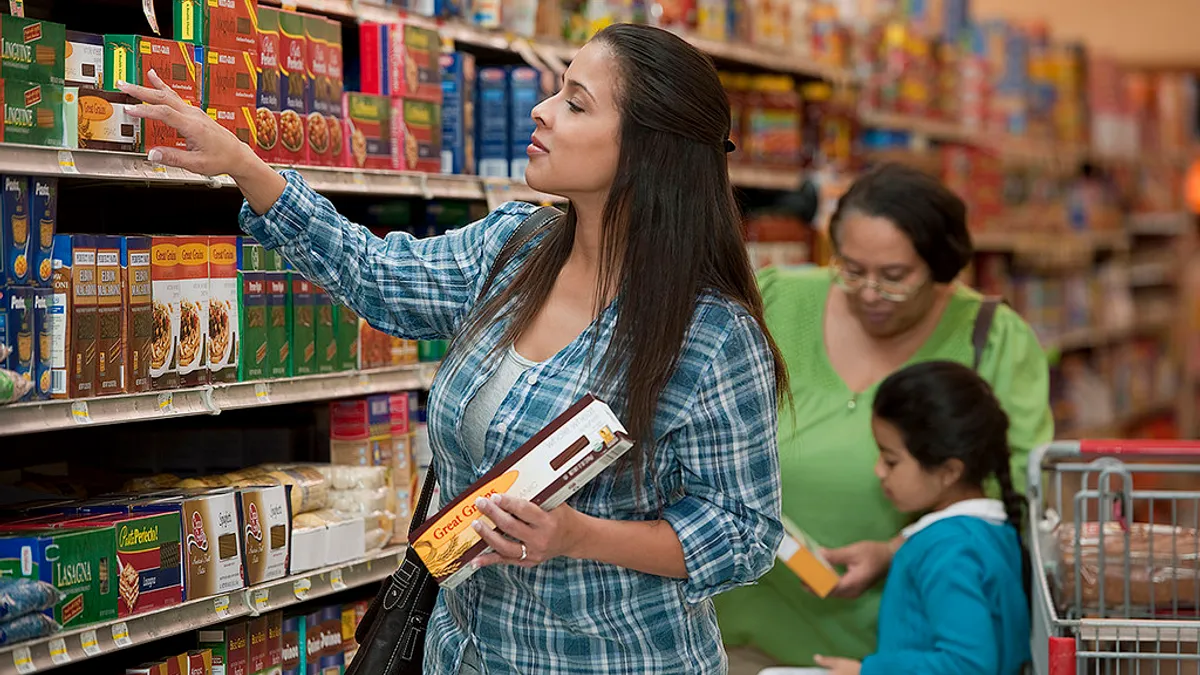Dive Brief:
- According to a survey by PwC of more than 1,600 U.S. consumers, COVID-19 and the recession are driving changes in shopper behavior that could be beneficial for grocers long-term. The survey found that 42% of consumers say they won't stop loading their pantries until COVID-19 is fully resolved, and that 64% will continue to maintain their current rate of pantry loading for the foreseeable future.
- Fifty-one percent of those surveyed reported a "significant increase" in cooking at home, and 69% said this activity has added to their quality of life during the pandemic. Sixty-five percent of those surveyed reported eating out less.
- The survey also shows that customers are experimenting with new brands when grocers are out of stock of their preferred brands. This is especially true for non-food consumables, non-perishable food and perishable items. When it comes to beverages and fresh prepared meals, shoppers say they're willing to try new brands even when their preferred brand is in stock.
Dive Insight:
The results of the PwC survey indicate the COVID-19 crisis will have a long-lasting effect on the grocery industry. It found that most surveyed customers are still worried about their safety and until COVID-19 is fully resolved, they plan to continue to fill their pantries with grocery items.
Eighteen percent of those who reported filling their pantries more than normal said they don't plan to stop doing so even after the virus is gone.
Some consumers are also stockpiling pantry items in response to product shortages. The survey found that 24% of respondents will continue to fill their pantry until grocery stores are consistently restocked. Out-of-stocks have also led to shoppers being more open to purchasing brands that they don’t normally buy in order to keep a stocked pantry.
Pantry loading has led to a surge in center store sales, breathing life into formerly flat or sagging categories like canned soup and dry cereal. Retailers are also seeing high sales in fresh produce, proteins and baking supplies that are key components of at-home meals.
As restaurants begin to reopen, the question is whether sales for pantry items and fresh meal components will continue. Judging by the PwC survey, this trend will continue for at least the length of the pandemic. Seventy-nine percent of those surveyed report they now enjoy cooking at home at least occasionally, and 66% said they are reluctant to eat at restaurants due to safety concerns.
As consumers become increasingly price sensitive during the recession, many are turning to private label. According to product data firm IRI, store brand sales will increase between $10 billion and $12 billion this year, up from a $2.5 billion increase a year ago, to $93 billion to $95 billion.
The PwC survey shows consumers haven stepped up the safety precautions they're taking as the virus has spread. Seventy-eight percent said they're wearing a face mask outdoors at least in some circumstances, up from 21% in March. Eighty percent say they're observing six-foot distancing around people outside their homes, compared to 70% who reported they were taking this precaution in March.













